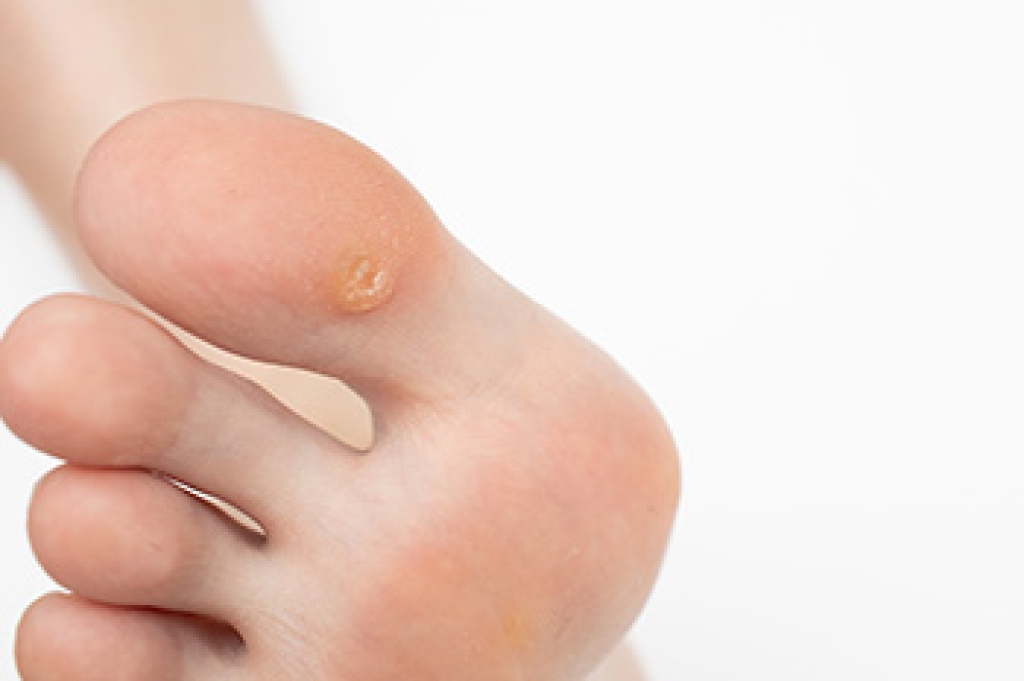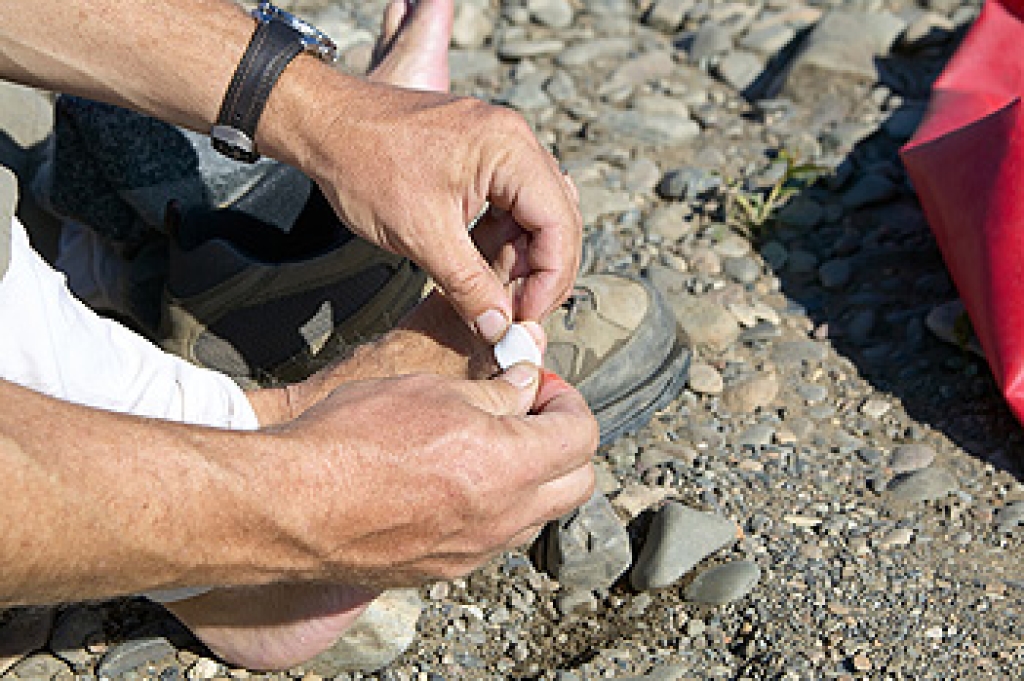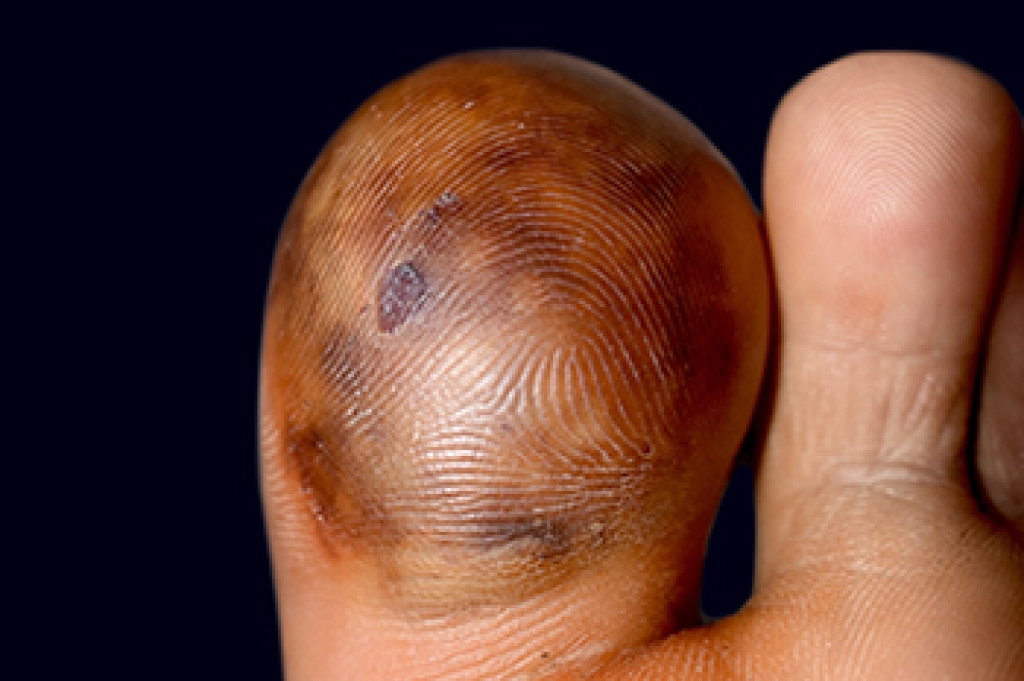Blog
What Are Plantar Warts?

Plantar warts are small growths that develop on the soles of the feet due to infection from the human papillomavirus, or HPV. This virus enters the skin through tiny cuts or abrasions, often in warm and moist environments like locker rooms or public showers. Risk factors include walking barefoot in shared spaces, weakened immunity, and direct contact with contaminated surfaces. Plantar warts may appear as rough, grainy lesions with tiny black dots in the center, and can cause pain while walking or standing. They sometimes grow inward because of pressure on the foot. A podiatrist can diagnose and safely treat plantar warts with effective in-office procedures. If you think you have developed a plantar wart, it is suggested that you consult a podiatrist who can offer effective relief solutions.
Plantar warts can be very uncomfortable. If you need your feet checked, contact Jennifer Swan, DPM from Right Step Foot Care. Our doctor will assist you with all of your foot and ankle needs.
About Plantar Warts
Plantar warts are the result of HPV, or human papillomavirus, getting into open wounds on the feet. They are mostly found on the heels or balls of the feet.
While plantar warts are generally harmless, those experiencing excessive pain or those suffering from diabetes or a compromised immune system require immediate medical care. Plantar warts are easily diagnosed, usually through scraping off a bit of rough skin or by getting a biopsy.
Symptoms
- Lesions on the bottom of your feet, usually rough and grainy
- Hard or thick callused spots
- Wart seeds, which are small clotted blood vessels that look like little black spots
- Pain, discomfort, or tenderness of your feet when walking or standing
Treatment
- Freezing
- Electric tool removal
- Laser Treatment
- Topical Creams (prescription only)
- Over-the-counter medications
To help prevent developing plantar warts, avoid walking barefoot over abrasive surfaces that can cause cuts or wounds for HPV to get into. Avoiding direct contact with other warts, as well as not picking or rubbing existing warts, can help prevent the further spread of plantar warts. However, if you think you have developed plantar warts, speak to your podiatrist. He or she can diagnose the warts on your feet and recommend the appropriate treatment options.
If you have any questions, please feel free to contact our office located in Westerville, OH . We offer the newest diagnostic and treatment technologies for all your foot care needs.
Ingrown Toenails and Podiatric Care

Ingrown toenails occur when the edge of a toenail grows into the surrounding skin, causing inflammation, pain,and possible infection. This condition often leads to redness, swelling, tenderness, and drainage surrounding the nail. Common causes include improper nail trimming, curved nails, wearing tight shoes that place pressure on the toes, and repeated trauma to the nail. Ingrown toenails are one of the most common nail problems treated in podiatry, and can worsen if not addressed early. A podiatrist can safely remove the ingrown portion of the nail, treat the infection, and provide guidance on proper nail care and footwear. If you notice toe pain, redness or swelling, it is suggested that you consult a podiatrist who can accurately diagnose the problem, and offer effective relief and treatment solutions.
Ingrown toenails can become painful if they are not treated properly. For more information about ingrown toenails, contact Jennifer Swan, DPM of Right Step Foot Care. Our doctor can provide the care you need to keep you pain-free and on your feet.
Ingrown Toenails
Ingrown toenails occur when a toenail grows sideways into the bed of the nail, causing pain, swelling, and possibly infection.
Causes
- Bacterial infections
- Improper nail cutting such as cutting it too short or not straight across
- Trauma to the toe, such as stubbing, which causes the nail to grow back irregularly
- Ill-fitting shoes that bunch the toes too close together
- Genetic predisposition
Prevention
Wearing proper fitting shoes and using proper cutting techniques will also help decrease your risk of developing ingrown toenails.
Treatment
Ingrown toenails are a very treatable foot condition. In minor cases, soaking the affected area in salt or antibacterial soaps will not only help with the ingrown nail itself, but also help prevent any infections from occurring. In more severe cases, surgery is an option. In either case, speaking to your podiatrist about this condition will help you get a better understanding of specific treatment options that are right for you.
If you have any questions, please feel free to contact our office located in Westerville, OH . We offer the newest diagnostic and treatment technologies for all your foot care needs.
Preventing Toenail and Toe Discomfort While Hiking

Toenail and toe pain while hiking is a common problem that can turn an enjoyable outdoor adventure into a painful experience. Causes often include wearing shoes that are too tight or too loose, friction from improper socks, and repetitive impact on uneven terrain. To prevent these issues, it is important to wear properly sized hiking shoes, gradually break them in before long treks, and choose socks with cushioning and reinforcement in key areas. These steps help reduce pressure on the toes, prevent blisters, and protect the toenails from trauma. A podiatrist can evaluate your foot structure, recommend appropriate footwear, and provide treatment for any persistent pain or nail injuries. If you have toe or toenail pain that is preventing you from enjoying your hiking experience, it is suggested that you consult a podiatrist for appropriate treatment solutions.
Toe pain can disrupt your daily activities. If you have any concerns, contact Jennifer Swan, DPM of Right Step Foot Care. Our doctor can provide the care you need to keep you pain-free and on your feet.
What Causes Toe Pain?
Most severe toe pain is caused due to a sports injury, trauma from dropping something heavy on the toe, or bumping into something rigid. Other problems can develop over time for various reasons.
Toe pain can be caused by one or more ailments. The most common include:
- Trauma
- Sports injury
- Wearing shoes that are too tight
- Arthritis
- Gout
- Corns and calluses
- Hammertoe
- Bunions
- Blisters
- Ingrown toenails
- Sprains
- Fractures (broken bones)
- Dislocations
When to See a Podiatrist
- Severe pain
- Persistent pain that lasts more than a week
- Signs of infection
- Continued swelling
- Pain that prevents walking
Diagnosis
In many cases the cause of toe pain is obvious, but in others, a podiatrist may want to use more advanced methods to determine the problem. These can range from simple visual inspections and sensation tests to X-rays and MRI scans. Prior medical history, family medical history, and any recent physical traumatic events will all be taken into consideration for a proper diagnosis.
Treatment
Treatments for toe pain and injuries vary and may include shoe inserts, padding, taping, medicines, injections, and in some cases, surgery. If you believe that you have broken a toe, please see a podiatrist as soon as possible.
If you have any questions please contact our office located in Westerville, OH . We offer the newest diagnostic and treatment technologies for all your foot and ankle needs.
Cellulitis of the Feet

Cellulitis is a bacterial skin infection that affects the deeper layers of the skin and soft tissue, often involving the feet and ankles. It can cause redness, warmth, swelling, and pain, sometimes spreading quickly. In the feet, cellulitis may begin through a cut, blister, or ulcer. It is often confused with gout because both conditions can cause sudden swelling, redness, and significant pain. Gout symptoms typically include intense joint pain, stiffness, and inflammation, often starting in the big toe. Cellulitis symptoms also include tenderness, fever, and skin that appears tight or shiny. Cellulitis is caused by bacteria entering the skin, while gout is caused by uric acid buildup. A podiatrist can diagnose the condition, provide appropriate treatment, and help prevent complications. If you have any of the above symptoms, it is suggested that you promptly consult a podiatrist who can guide you toward appropriate relief and treatment solutions.
Foot Pain
Foot pain can be extremely painful and debilitating. If you have a foot pain, consult with Jennifer Swan, DPM from Right Step Foot Care. Our doctor will assess your condition and provide you with quality foot and ankle treatment.
Causes
Foot pain is a very broad condition that could be caused by one or more ailments. The most common include:
- Bunions
- Hammertoes
- Plantar Fasciitis
- Bone Spurs
- Corns
- Tarsal Tunnel Syndrome
- Ingrown Toenails
- Arthritis (such as Gout, Rheumatoid, and Osteoarthritis)
- Flat Feet
- Injury (from stress fractures, broken toe, foot, ankle, Achilles tendon ruptures, and sprains)
- And more
Diagnosis
To figure out the cause of foot pain, podiatrists utilize several different methods. This can range from simple visual inspections and sensation tests to X-rays and MRI scans. Prior medical history, family medical history, and any recent physical traumatic events will all be taken into consideration for a proper diagnosis.
Treatment
Treatment depends upon the cause of the foot pain. Whether it is resting, staying off the foot, or having surgery; podiatrists have a number of treatment options available for foot pain.
If you have any questions, please feel free to contact our office located in Westerville, OH . We offer the newest diagnostic and treatment technologies for all your foot care needs.

